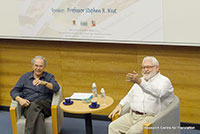The Renditions Distinguished Lecture Series on Literary Translation was established by the Research Centre for Translation of the Institute of Chinese Studies in 2013, in celebration of the 40th anniversary of Renditions, the world-renowned journal of Chinese literature in English. This lecture series is an annual event at which key figures in the field of literary translation are invited to talk about their experiences. It is the Centre's great hope that this lecture series will, together with the publications in Renditions, reinforce the journal's founding goals of giving Western readers a chance to know Chinese works of literary art and the humanities, and of promoting discussion on the art of literary translation.  This year's lecture, entitled 'Commentary: Cultural information and minimal literacy in text and translation', was given by Professor Stephen H West, the foundation Professor of Chinese at Arizona State University and the guest editor of Renditions' new special issue on traditional Chinese fiction commentary. The lecture was held on 4 November 2014 at the Mong Man Wai Building, CUHK, and it received a favourable responses from students, researchers, translators, and scholars of translation studies and related fields. The lecture lasted for two hours, including a Q&A session that offered the audience a chance to put forward any questions they might have on literary translation. This year's lecture, entitled 'Commentary: Cultural information and minimal literacy in text and translation', was given by Professor Stephen H West, the foundation Professor of Chinese at Arizona State University and the guest editor of Renditions' new special issue on traditional Chinese fiction commentary. The lecture was held on 4 November 2014 at the Mong Man Wai Building, CUHK, and it received a favourable responses from students, researchers, translators, and scholars of translation studies and related fields. The lecture lasted for two hours, including a Q&A session that offered the audience a chance to put forward any questions they might have on literary translation.
In accordance with the new Renditions special issue, Professor West shared his inspirational experience in reading Jin Shengtan's commentary on The Story of the Western Wing. He showed how he had used the translation process as a means for examining his own understanding of the source text. As a sinologist and scholar of Chinese literature, Professor West affirmed that translation should be as faithful as possible, to ensure that upon reading the translated text the readers can receive as much information as they would from reading the Chinese original. In addition, the reader should also be able to gain insights into the original text as interpreted by the translator, which can be provided in the form of footnotes. In many ways, translation bears similar characteristics with traditional Chinese fiction/drama commentary. Although long neglected in modern English translations of Chinese classics, commentary is a valuable form of discourse that holds the power to shape the reading experience by transporting meaning out of the text and into the minds of the readers. The many generations of commentators have also left valuable information about their own times. Translation likewise allows readers to gain insights into how the translator and other people of his generation and culture interpret a work, a style and a period. With numerous examples, Professor West pointed out the importance of marginal and linear commentaries in raising the readers' awareness of the cultural nuances conveyed in the original works. Believing that commentaries can provide critical insights and new ways to understand classics, Professor West encouraged a scholarly reading and translation of commentaries to make this unique literary form accessible to a wider readership. He proposed that through this process, translated works themselves may gain their own unique value as primary sources for investigation in scholarly research. The Renditions Distinguished Lecture Series on Literary Translation (RTC) allows translators and those interested in the practice to reflect on the whys and hows of translation through listening to the experiences of expert translators in a very casual and comfortable setting. The RCT administrators hope that through an exchange of ideas and a sharing of experience, the annual lecture series will serve as a source of motivation and inspiration for many translators who pursue lonely art of literary translation. For those who missed the lecture, the video can be found at http://www.cuhk.edu.hk/rct/. Please visit our website to find out about the Centre's latest efforts in translating Chinese literature and promoting historical translation studies. |













